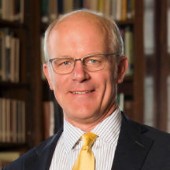Great leaders of congregational song attend to the new community formed every time a church gathers.
By Peter W. Marty

Much of the meaning we find in our personal lives stems from contributions by people we often neglect to thank. Individuals who impact us in untold ways inadvertently get overlooked. Some of the unsung heroes who’ve helped make me who I am are church musicians. Worship organizes my life and centers my soul in ways that you can only know by knowing me. But the music of worship is what has helped generate the particular kind of person I am.
Gifted church musicians know how to help people sing together. They’re genius at helping a congregation get “lost in wonder, love, and praise,” to borrow Charles Wesley’s words, without simply getting lost. Week in and week out, these practitioners enlarge individual worlds, send chills up spines, and remind worshipers that singing is not an external option for our lives; it’s an internal component of being fully human. This column is for all those who help congregations make music on a weekly basis but who might not often hear how much their work matters to those around them.
Every time a congregation gathers, a new community must form. Even if the assembly just met the previous week, its character has altered. Various component parts have shifted. Bodies have aged, however slightly. New joys have walked in the door. Fresh sorrows have settled into a back pew. Two tenors from the choir are missing. An elder has died. A baby gets happily passed around. A funny bulletin typo has people whispering. One of the spotlights above the pulpit is flickering annoyingly.
It’s the musicians who must pay attention to all of the nuances of this new community. They have the job of listening closely to everything that’s going on. They must assume responsibility for helping the boundaries and distinctions of this diverse group of people relax enough to become fresh solidarity. This is hard work that requires no small degree of faith, skill, and humility. But if it’s successful, a bonding of people will occur. A thickness of congregational spirit will emerge. A weight of mystery will fill up the interior dimensions of people’s lives. Those who thought they couldn’t sing, or who don’t want to sing, suddenly find themselves enveloped in lovely ways by the resonant voice of the church singing together.
Excellent church musicians— whether they play piano, lean into an organ, lead a band, compose music, or direct a choir—are theologians in their own right. They’re people convinced that the glory of God is central to honest worship and not just some Jesus-y feelings that can well up inside the bellies of hungry worshipers. They’re busy fighting for the congregation to find its voice, yearning for each and every soul to discover that singing is sacred duty. Church musicians who have given the greatest shape to my life are those who appear to delight more in getting music into my soul than just out of theirs. Yes, the talent of their hands, feet, and vocal cords may be awesome, which is beautiful. But the way they deploy their abilities determines whether the rest of us feel bigger or smaller than when we arrived.
Eugene Peterson suggests that song is the result of excess energy. “When we are normal, we talk,” says Peterson. “When we are dying, we whisper. But when there is more in us than we can contain, we sing.” The next time you find yourself in worship experiencing more joy than you can hold inside yourself, sing like your life depends on it. And then, flag down your music leader on your way out the door to let them know of your gratitude.